How Commuting Impacts the Environment
Transportation is a major source of CO2 emissions contributing to climate change and, in case it doesn’t go without saying, personal vehicles emit more harmful CO2 mile-for-mile than shared transportation. Emissions standards for cars and trucks help. In fact, in the United States, CO2 emissions from vehicles were down 6% in 2021 compared to 2005 levels, in spite of an increase in overall numbers of vehicles on the road. Unfortunately, the United Nations Environmental Program has called for at least a 45% decrease in emissions to prevent global temperature increases above 1.5 degrees Celcius.
As more and more remote workers return to the office, the percentage of people who drive to work in a single-occupancy vehicle remains high. A Statista survey found that, even with high rates of telecommuting, a majority (63% of workers) commute to a job by car.
Climate awareness and interest in climate-action are on the rise, and corporate sustainability practices factor into employment decisions for many workers. Employers, government agencies, and individuals all have an interest in reducing the impact our commutes have on the planet. Fortunately, while commuter behavior is one of the hardest habits to change, some employers and communities are having success using strategies grounded in behavioral science.
The impact of driving to work
Commuting to work accounts for nearly all of an individual employee’s job-related carbon footprint. A look at the CO2 emissions resulting from commuting by car shows that individual choices can have a big impact.
The average American commute is around 15 miles each way. Here’s how that translates into CO2 emissions in each year in different types of personal vehicles:
- Small car (35 MPG fuel economy): 2.1 tons
- Midsize car (20 MPG fuel economy): 3.9 tons
- Full-size car/SUV (14 MPG fuel economy): 5.7 tons
While the Environmental Protection Agency (EPA) is introducing policies to accelerate the shift to electric vehicles, the transition will not happen overnight. A New York Times report found that in 2021, fewer than 1% of the 250 million cars on U.S. roads were electric. So, getting even a small percentage of commuters out of cars and into cleaner, smarter modes of transportation can have a measurable positive impact on air quality.
Small changes can have big positive impacts
If just 5% of the 106.4 million American workers who currently commute by single-occupancy vehicle shifted to another mode they could save nearly 21 million tons of CO2 per year.
At RideAmigos, we are on a mission to change the way the world commutes by empowering everyone to make smarter transportation choices.
Commute management can make a difference
Implementing commuter programs at a community or organizational level can be a big help. Businesses, schools, government agencies, and universities all have a role to play in reducing carbon emissions from commuting. Fortunately, trip reduction programs also have other benefits to people and organizations!
Here are some examples of organizational transportation demand management strategies that work to encourage transportation sustainability:
- Flexible daily choice parking: When parking is free as a benefit, or paid by commuters on monthly or annual basis, the effect is a feeling of being “locked-in.” Not using a parking pass that is already paid for might feel like a waste, especially if they’d have to pay for a transit ticket on top of that. By transitioning to a daily option, communities and organizations can provide commuters more flexibility to make the best choice each day — so perhaps they can drive on days they need a car for school drop-off or other errands, but bike or ride transit on other days. Automate payment each time an employee reserves a parking space. Or when parking is already provided, allowing people the option to “cash-out” the benefit on days they don’t need it is a highly effective way to do this.
- Subsidies and incentives: When parking is free and driving is the default, many people don’t see the downside of commuting by car. To help shift the calculus, organizations that can’t or aren’t ready to charge for parking can similarly subsidize other modes by offering free transit passes, providing a guaranteed ride program for carpoolers, offering micro-mobility options and, of course, offering great facilities for cyclists like bike lockers and showers.
- A personalized approach to carpooling: Carpooling can be an excellent option for commuters who are not well-served by public transit. So why is it so hard to convince people to try it? New group-based pooling programs that automatically connect commuters based on schedule and preferences are revolutionizing ridesharing. Apps like Pave Commute automate this tried-and-true transportation demand management tactic and dynamically personalize for everyone in a community or organization, with real-time chat and other nudges.
- Gamification: Some people might find a perfect commute and just stick to it. But the reality is that schedules are not always the same, weather changes, transit delays happen, and construction projects snarl traffic. An app-based program that keeps commuters engaged with ongoing gamification can ensure that whenever things change, commuters have help to make a sustainable choice — instead of just hopping in the car.
These strategies work at all levels — from individual employers to entire regions. In addition to reducing reliance on single-occupancy vehicles, these programs can improve the commute experience and give every participant the opportunity to contribute to critical sustainable development goals (SDGs). Regardless of the type and size of an organization, or the complexity of its transportation needs, technology can help scale and automate these proven commute management strategies.
Empower employees to make more sustainable commute choices
Organizations that implement the right commute management programs see real modeshift results and improved commuter experience. RideAmigos apps and programs are designed by experts, based on behavioral science to scale effective strategies. Commuters using our apps avoided over 61 million vehicle miles traveled and reduced over 40 million pounds of CO2 in 2022. Join us to start making your impact today. Contact us to get started.









Leave a Reply
Want to join the discussion?Feel free to contribute!